Publications
-
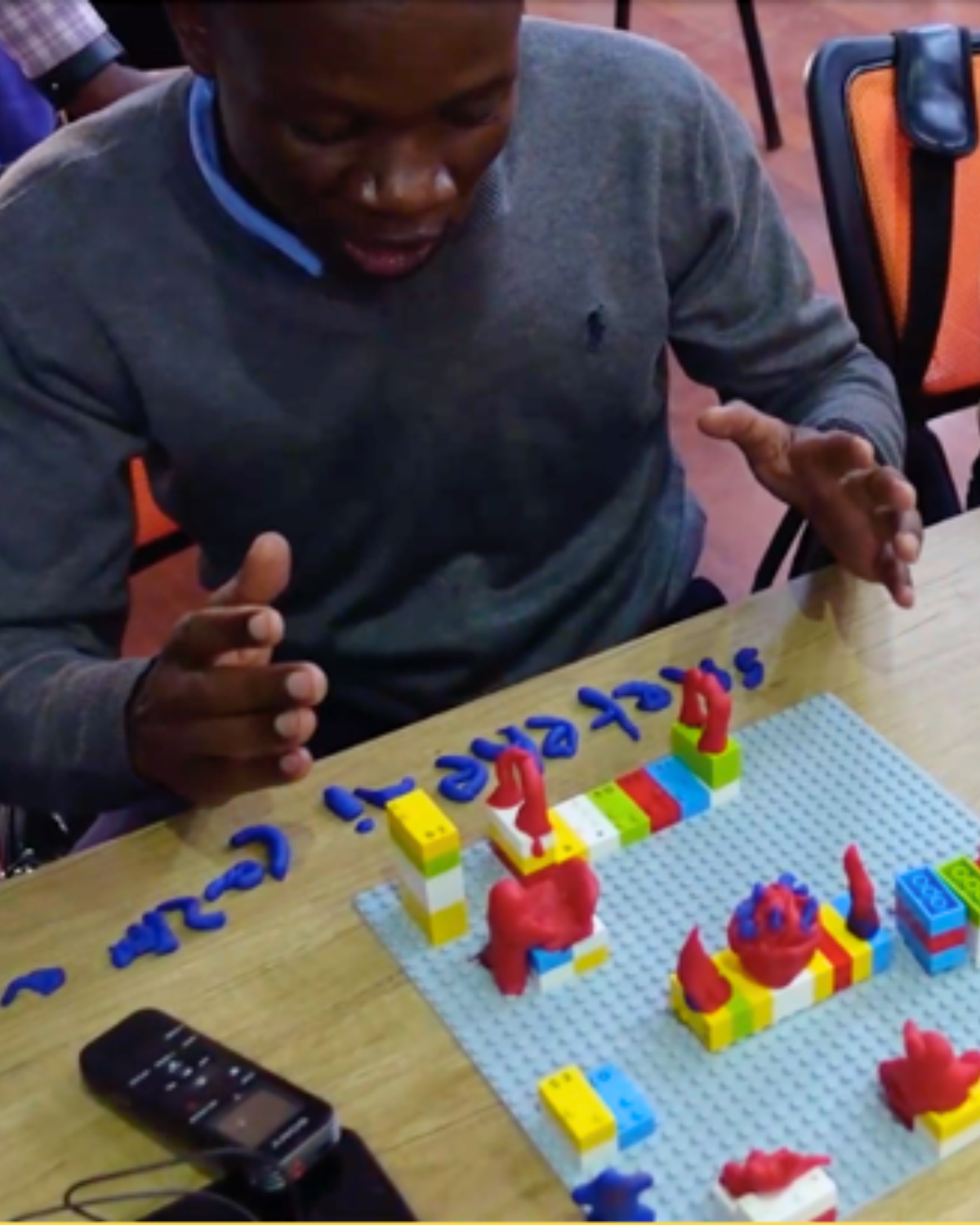
Storytelling for Assistive Technology Advocacy
Maryam BandukdaMarch 25, 2025Case Studies and ReportsThis case study highlights storytelling workshops in Kenya and Pakistan, part of the AT2030 programme, empowering individuals with visual and hearing impairments to advocate for assistive technology and disability rights. Through participatory activities and tools participants reflected on their experiences, set advocacy goals, and crafted personal stories to amplify their voices.
-
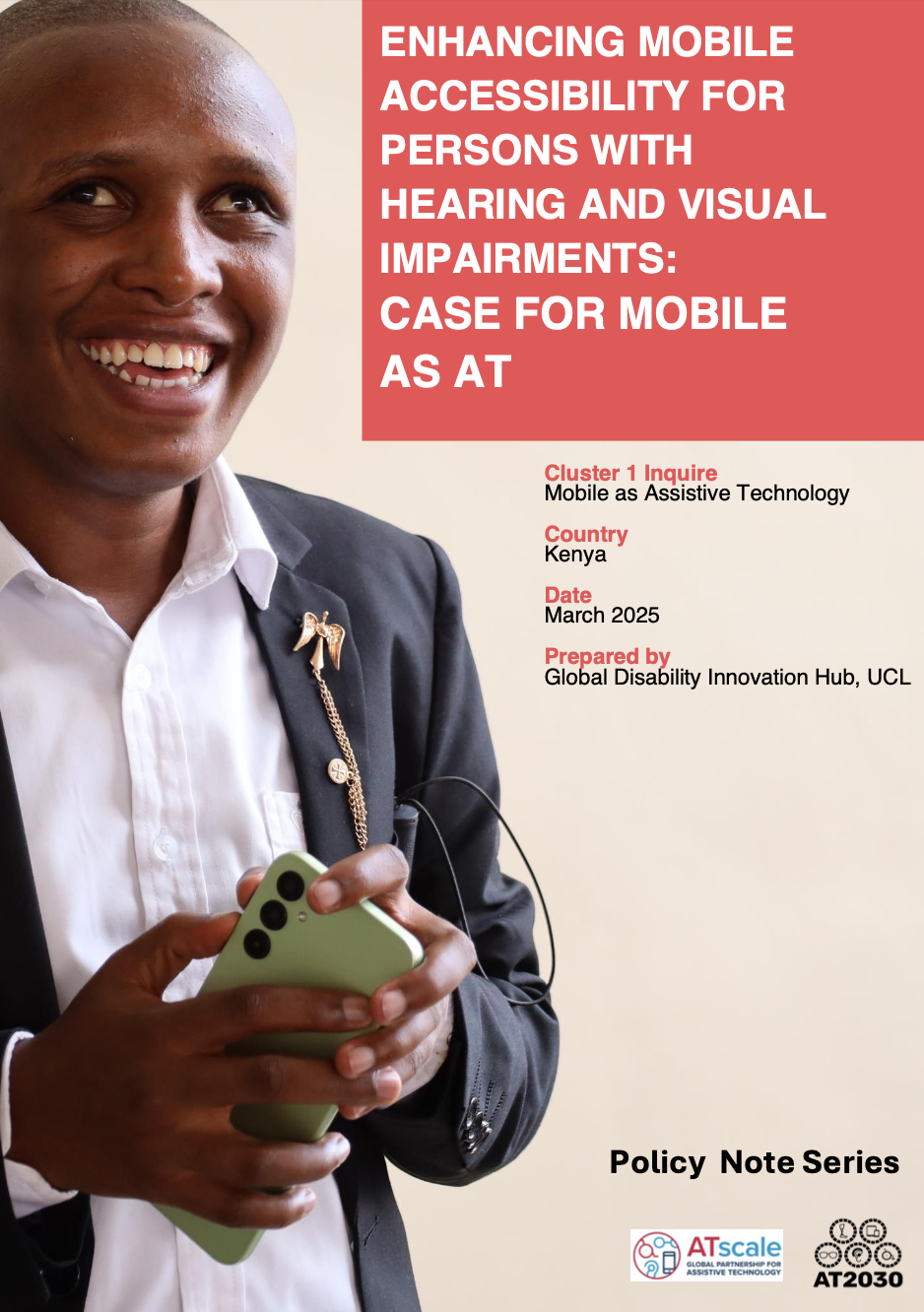
Enhancing mobile accessibility for persons with hearing and visual impairments: case for mobile as AT
Global Disability Innovation HubMarch 21, 2025Academic Research PublicationsThis study assessed the feasibility and impact of providing smartphones and digital skills training to individuals with visual and hearing impairments in India, Kenya, and Brazil. Over 750 participants were trained to use Android accessibility features, with a focus on enhancing communication, education, and employment opportunities.
-
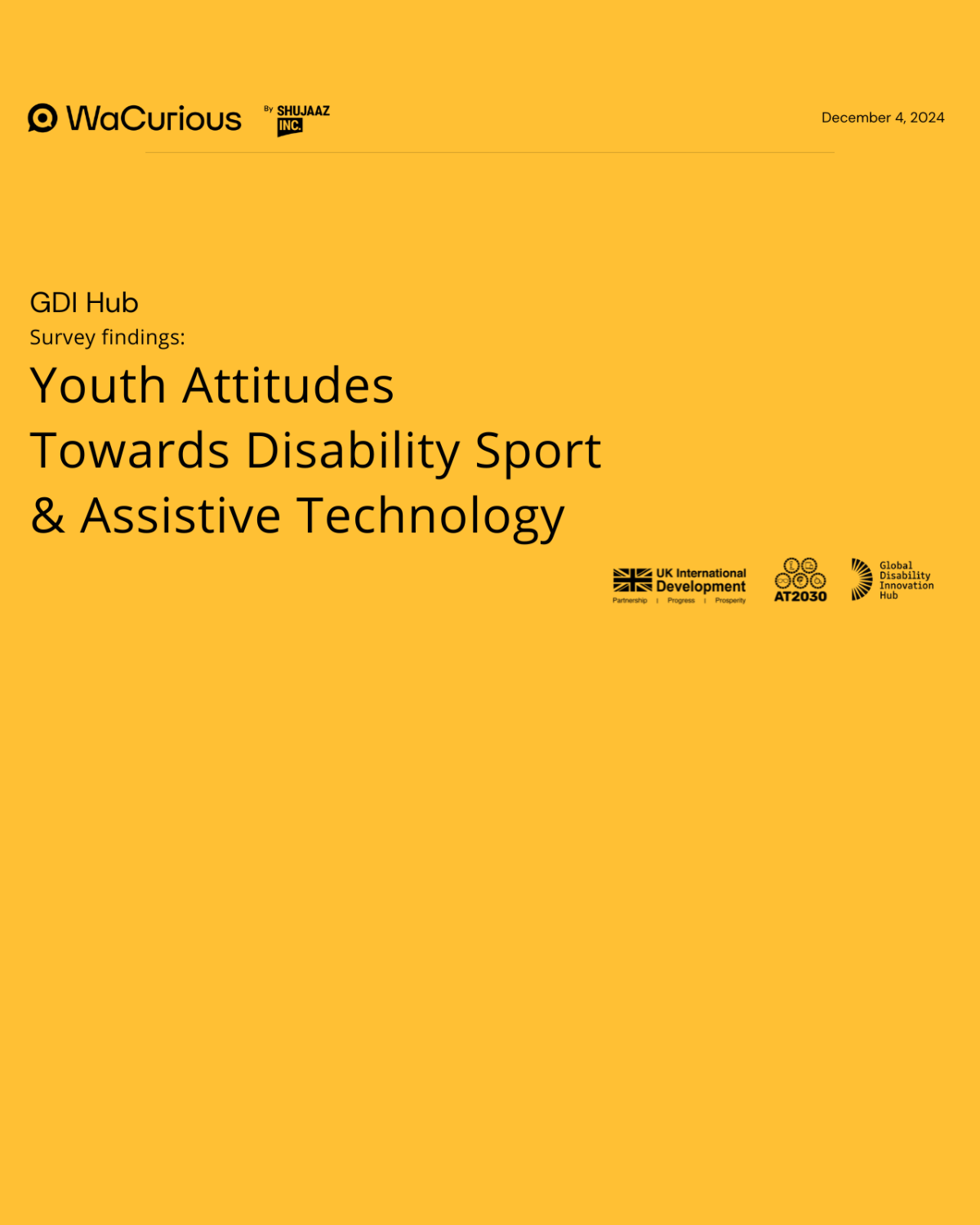
Youth Attitudes Towards Disability Sport & Assistive Technology
Shujaaz IncMarch 20, 2025Academic Research PublicationsThe 2024 Paralympic Games present a unique cultural moment to amplify the voices and stories of persons living with disabilities. To leverage this global event, the Global Disability Innovation Hub partnered with Shujaaz, an Emmy award winning partner based in Kenya to create a comprehensive initiative that explores and highlights the cultural impact of disability beyond the realm of sports.
-
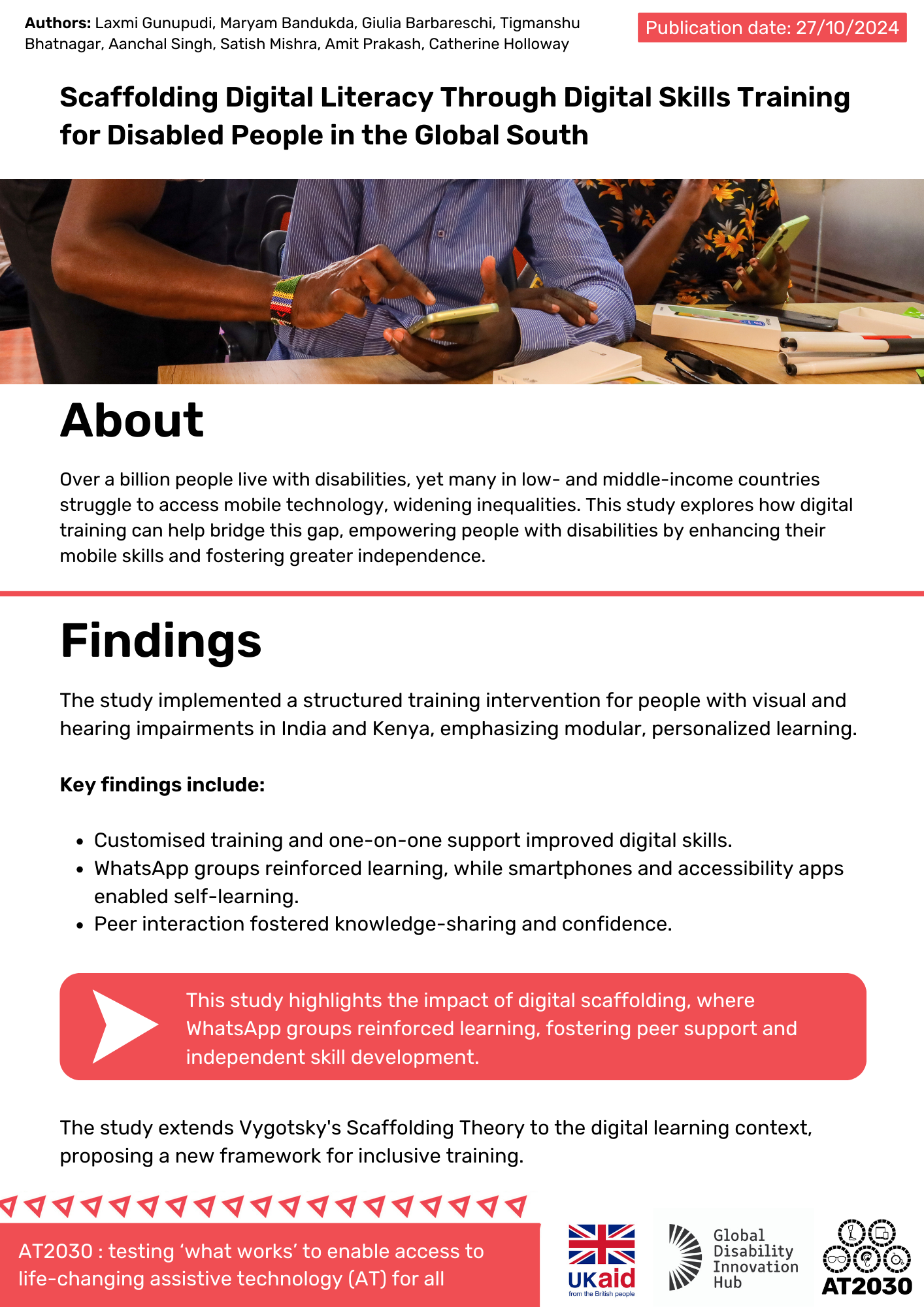
Scaffolding Digital Literacy Through Digital Skills Training for Disabled People in the Global South: Research Summary
Laxmi Gunupudi, Maryam Bandukda, Giulia Barbareschi, Tigmanshu Bhatnagar, Aanchal Singh, Satish Mishra, Amit Prakash, Catherine HollowayMarch 12, 2025Research SummariesThis study explores how digital training empowers people with disabilities in low- and middle-income countries by improving mobile skills. Conducted in India and Kenya, it found that personalized training, accessibility apps, and WhatsApp groups enhanced learning, confidence, and peer support. Extending Vygotsky’s Scaffolding Theory, it proposes a new framework for inclusive digital training.
-
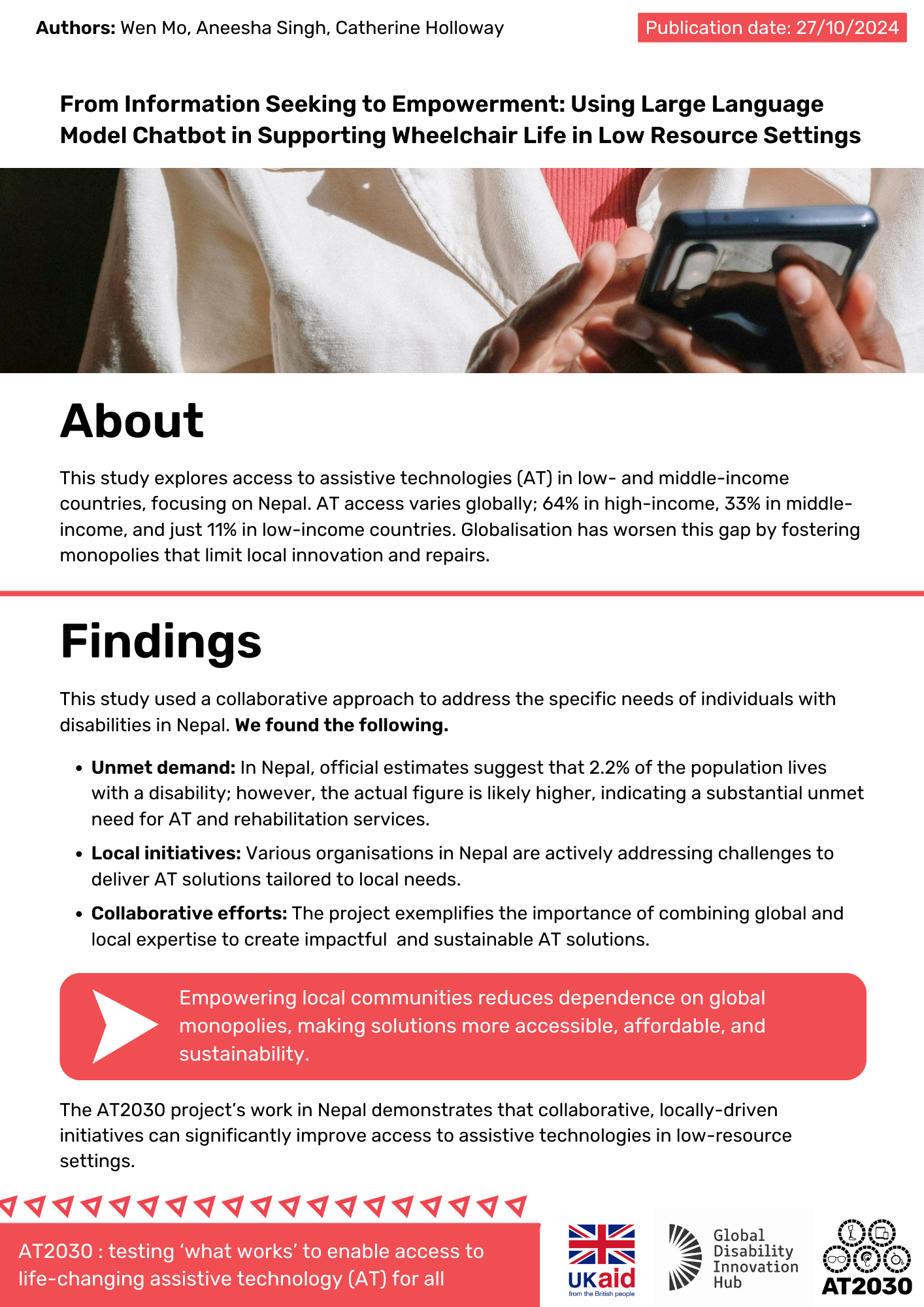
From Information Seeking to Empowerment: Using Large Language Model Chatbot in Supporting Wheelchair Life in Low Resource Settings - Research Summary
Wen Mo, Aneesha Singh, Catherine HollowayMarch 12, 2025Research SummariesThis study explores access to assistive technologies (AT) in low- and middle-income countries, focusing on Nepal, where access is much lower compared to high-income countries. Using a collaborative approach, the study found a significant unmet demand for AT in Nepal, with local initiatives successfully addressing specific needs. It highlights that combining global and local expertise creates sustainable solutions, reducing dependence on monopolies and improving accessibility and affordability.
-
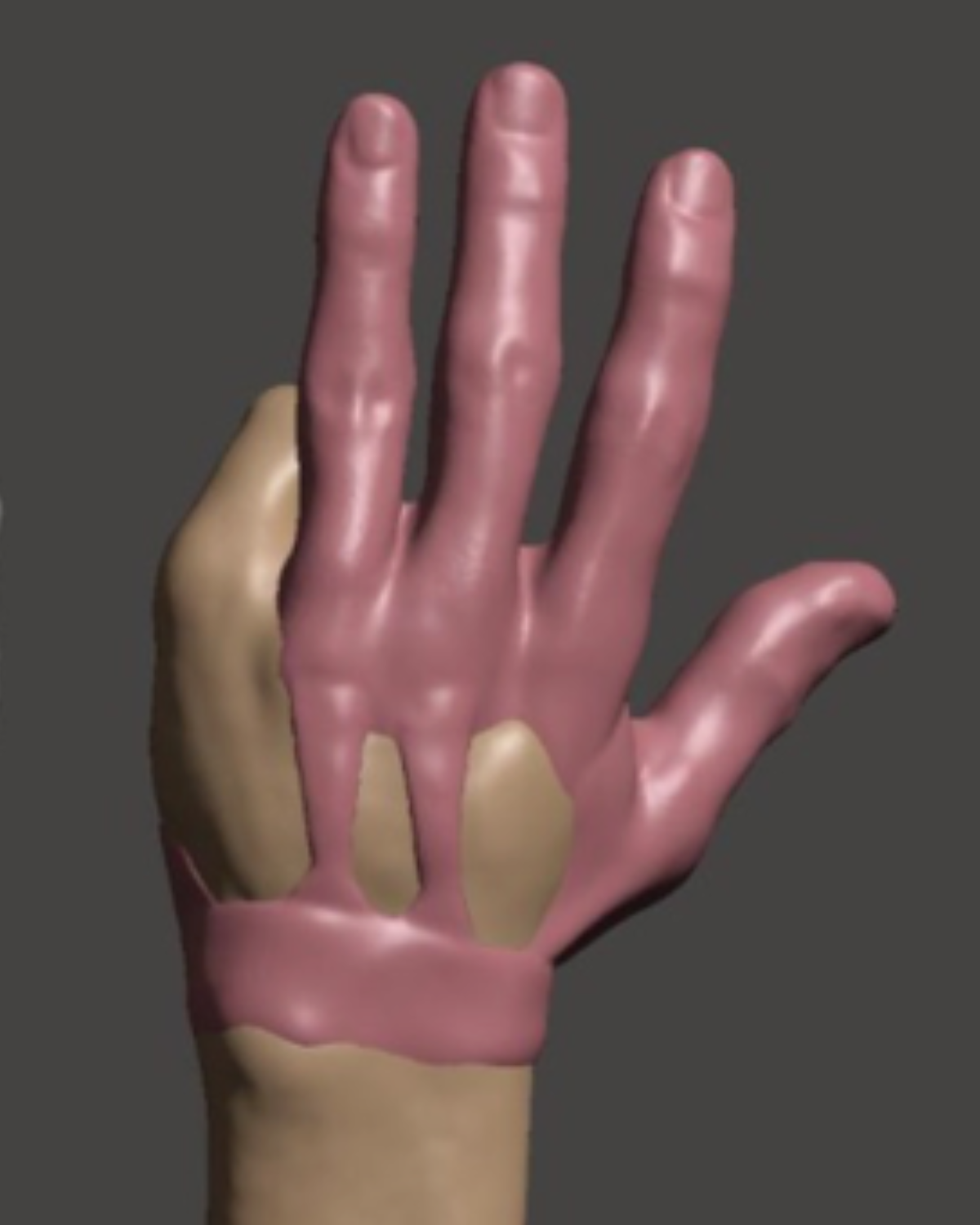
Locally Produced Prosthetics in Nepal
Dr Ben Oldfrey, RAM CHANDRA THAPA, Ashish Thapa, Bikash Paudel, Amit Bajracharya, Ganga Gurung, Rosemary Gowran, Pratisthit Lal Shrestha, Tigmanshu Bhatnagar, Mark Miodownik, Catherine HollowayFeb. 11, 2025NepalCase Studies and ReportsThese case study reports highlight locally produced prosthetics in Nepal, developed by GDI Hub, Zener Technologies, and the Enabling Fridays Community. The project blends global and local expertise to address individual needs, improve production processes, and foster innovation. This partnership evolved into a focused effort on assistive technologies, with two bespoke cases in Kathmandu featured in the reports.
-

Impact Stories Publications AT Data Portal AT Innovators AT Innovation Portal A scoping review of digital fabrication techniques applied to prosthetics & orthotics: Part 2 of 2 - Research Summary
Dr Ben Oldfrey, Dr Dafne Morgado Ramirez, Catherine Holloway, Matthew Wassall, Christopher Nester, Alex Dickinson, Man S Wong, Jamie Danemayer, Laurence Kenney, Edward Lemaire, Nerrolyn Ramstrand, Hossein Gholizadeth, Laura E Diment, Margaret K Donovan-Hall, Mark MiodownikJan. 9, 2025Research SummariesThis review explores digital fabrication for orthotic devices, highlighting CAD/CAM's proven success and AM's potential, though larger studies are needed. Digital methods can improve customisation and efficiency, but more research and collaboration are required to expand global access to quality orthotics.
-

Unlocking Sustainable and Resilient Assistive Technology Innovation and Delivery Ecosystems: Personalised Co-creation of Locally Produced Prosthetics: Research Summary
Dr Ben Oldfrey, RAM CHANDRA THAPA, Ashish Thapa, Bikash Paudel, Amit Bajracharya, Ganga Gurung, Rosemary Gowran, Pratisthit Lal Shrestha, Tigmanshu Bhatnagar, Mark Miodownik, Catherine HollowayJan. 9, 2025NepalResearch SummariesThe UK Aid-funded AT2030 project improved access to assistive technology in Nepal by developing locally produced prosthetics through collaboration between Nepali experts and global innovators. Emphasizing user-centred design, prosthetic users helped shape the final devices, ensuring they met both functional and personal needs. The project provided effective prosthetics while strengthening Nepal’s innovation capacity, securing further funding to expand the initiative.
-

Demographic, socioeconomic, and social barriers to use of mobility assistive products: a multistate analysis of the English Longitudinal Study of Ageing: Research Summary
Jamie Danemayer, Mikaela Bloomberg, Adam Mills, Catherine Holloway, Shereen HusseinDec. 12, 2024Research SummariesCross-sectional evidence suggests that access to essential mobility assistive products (MAPs) might be dependent on non-clinical factors. However, MAP use is better understood as a dynamic process wherein individuals pass through different states of MAP need and use. We aimed to test associations of demographic, socioeconomic, and social factors with transitions between MAP need and use states.
-
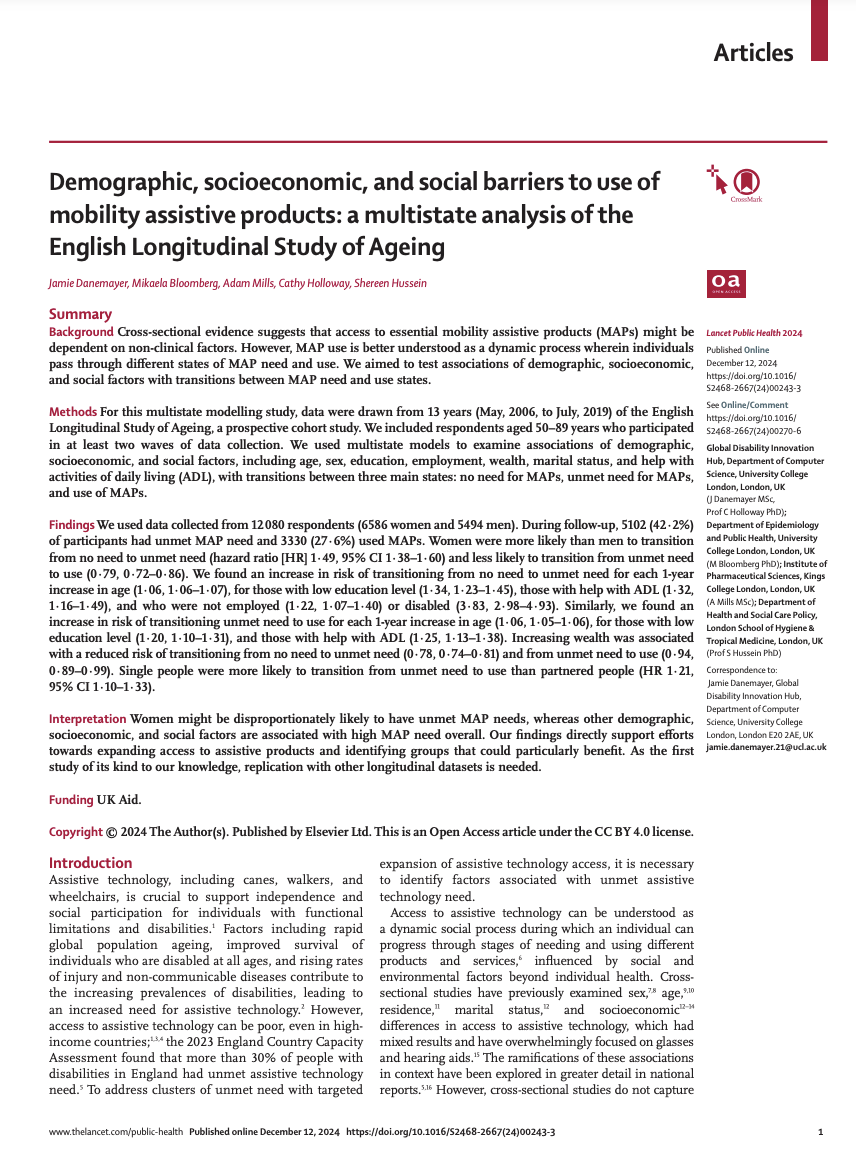
Demographic, socioeconomic, and social barriers to use of mobility assistive products: a multistate analysis of the English Longitudinal Study of Ageing
Jamie Danemayer, Mikaela Bloomberg, Adam Mills, Catherine Holloway, Shereen HusseinDec. 12, 2024Academic Research PublicationsFactors like age, gender, location, and socioeconomic status influence access to assistive technology. While much research focuses on devices like glasses and hearing aids, mobility aids (e.g., wheelchairs) often receive less attention despite growing demand. Understanding these access disparities is crucial for identifying the groups most in need of support and guiding better policies.
-
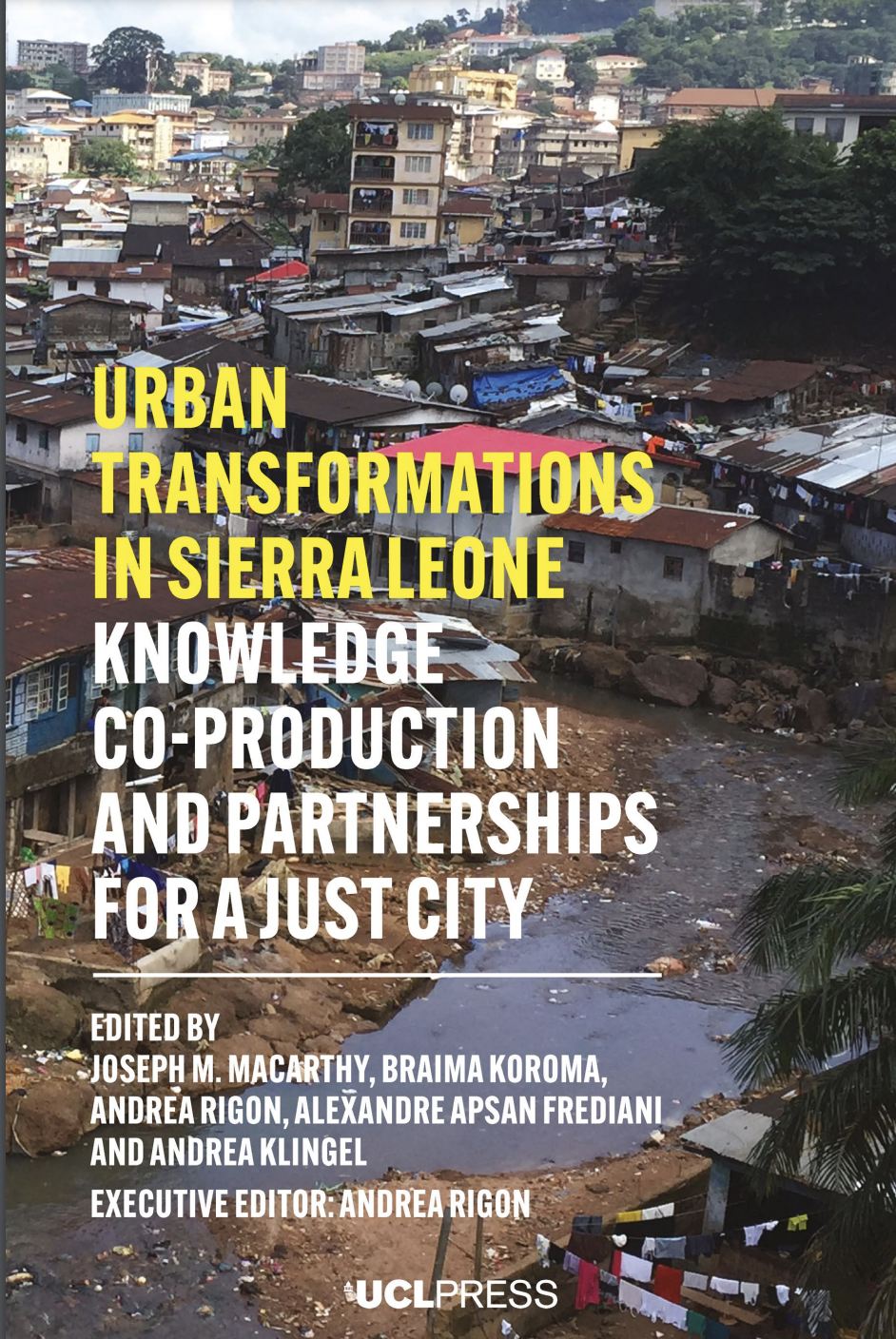
Urban Transformations in Sierra Leone
Joseph M. Macarthy, Braima Koroma, Andrea Rigon, Alexandre Apsan Frediani, Andrea KlingelDec. 5, 2024Academic Research PublicationsFreetown, Sierra Leone, faces challenges in services, housing, and infrastructure, worsened by climate change. SLURC, established in 2015, addresses urban issues through research, capacity building, and advocacy. Urban Transformations in Sierra Leone shares SLURC’s findings and partnerships, highlighting the value of transdisciplinary research for Freetown’s future.
-
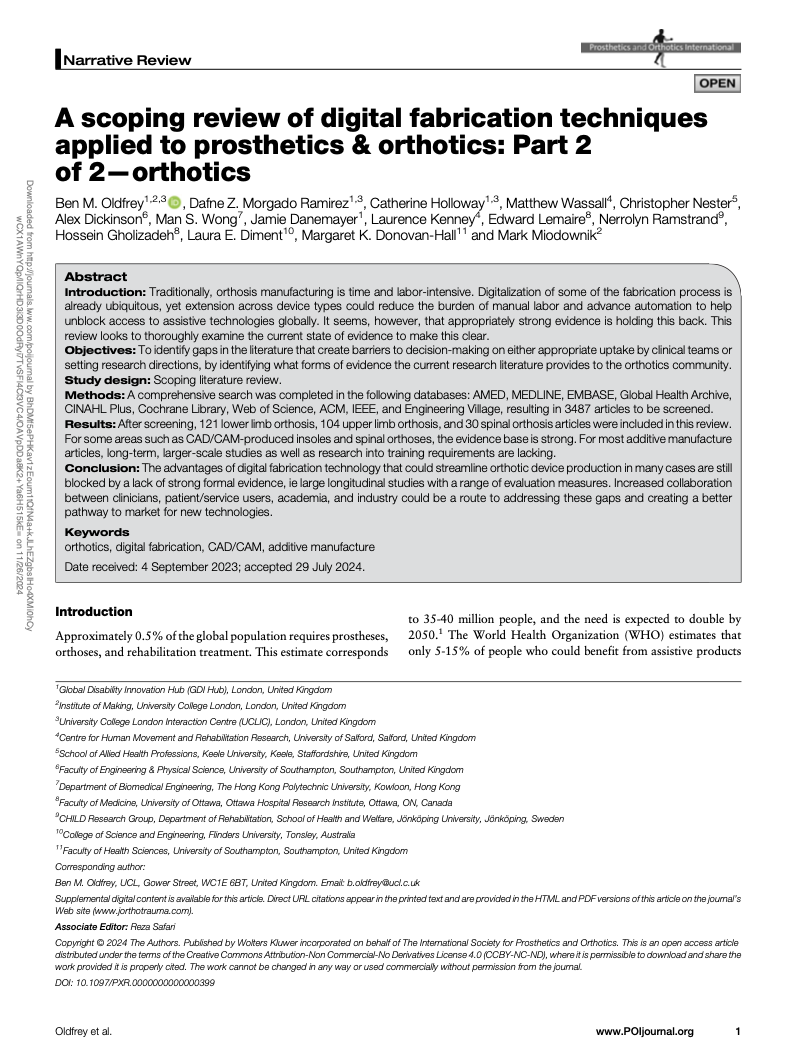
A scoping review of digital fabrication techniques applied to prosthetics & orthotics: Part 2 of 2
Dr Ben Oldfrey, Dr Dafne Morgado Ramirez, Catherine Holloway, Matthew Wassall, Christopher Nester, Alex Dickinson, Man S Wong, Jamie Danemayer, Laurence Kenney, Edward Lemaire, Nerrolyn Ramstrand, Hossein Gholizadeth, Laura E Diment, Margaret K Donovan-Hall, Mark MiodownikNov. 13, 2024Academic Research PublicationsDigitalisation of some of the fabrication process is already ubiquitous, yet extension across device types could reduce the burden of manual labour and advance automation to help unblock access to assistive technologies globally. It seems, however, that appropriately strong evidence is holding this back.
-
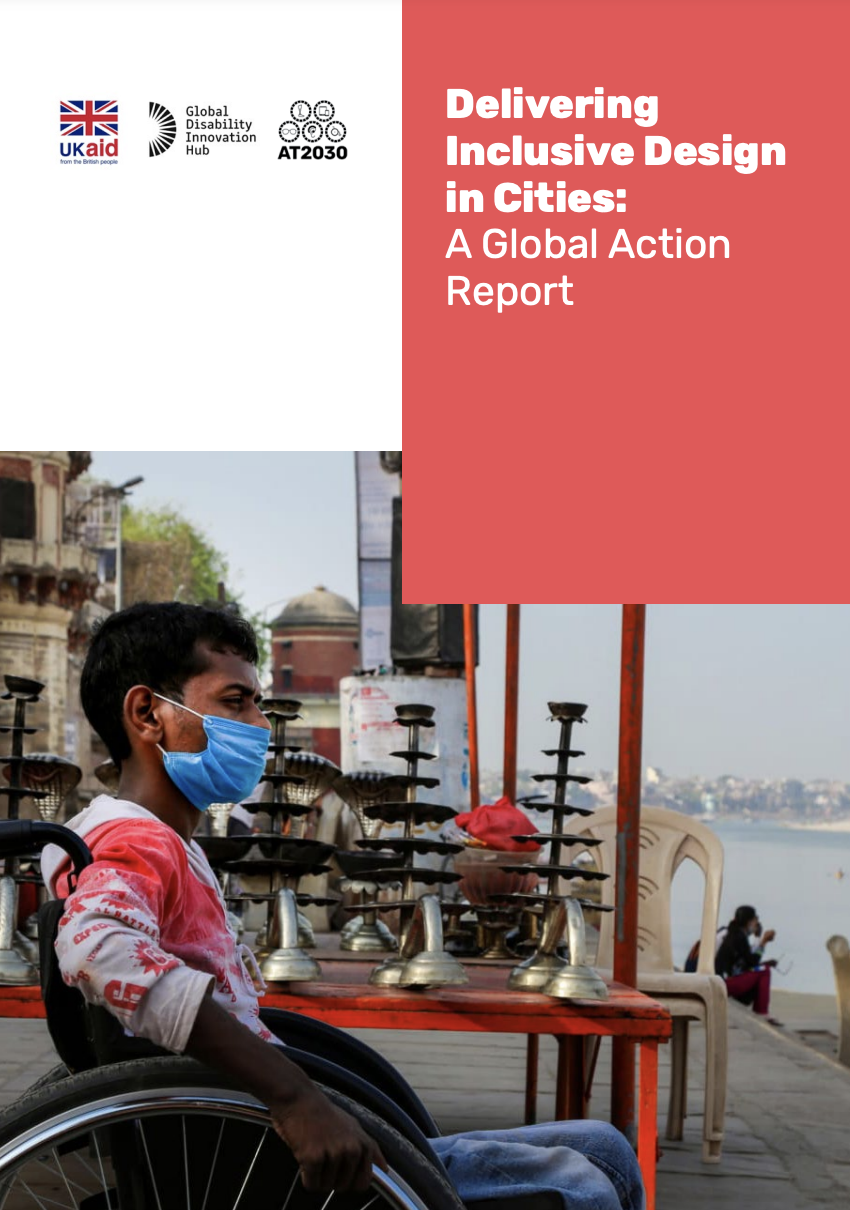
Inclusive Cities
Global Disability Innovation HubNov. 7, 2024GlobalCase Studies and ReportsThe Inclusive Infrastructure sub-programme, led by GDI Hub, recognises that the built environment, the world where we live, dictates our ability to use the AT we need. Access to the built environment is a fundamental human right, protected by the UN CRPD. However, the world we have designed and built presents a multitude of barriers and challenges for many, including persons with disabilities.
-
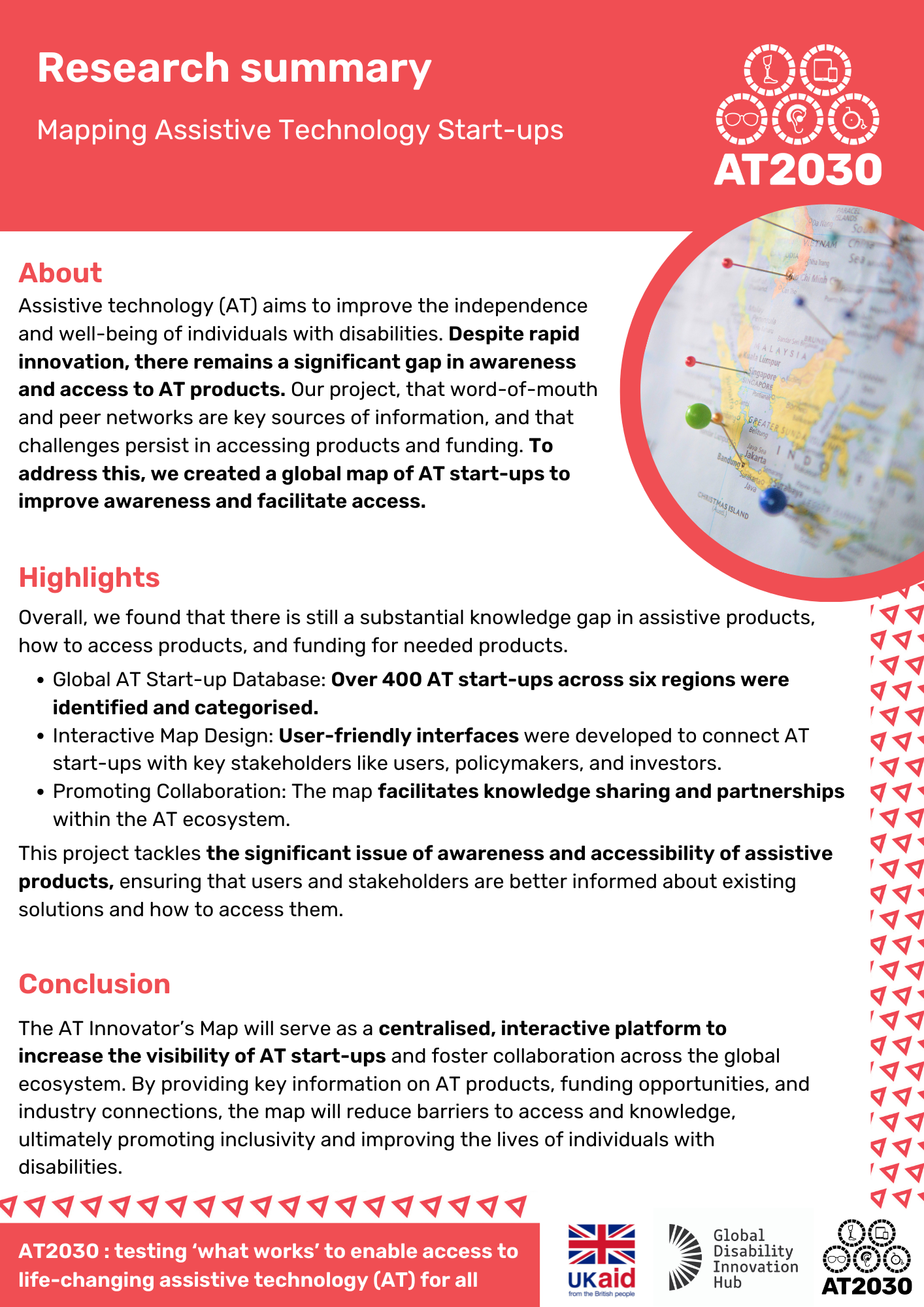
Mapping Assistive Technology StartUps: Research Summary
Patel Dilisha, Catherine Holloway, Tigmanshu BhatnagarNov. 7, 2024Research SummariesAssistive technology (AT) plays a crucial role in enhancing the independence and well-being of individuals with disabilities, but there is a significant gap in awareness and access to these products. Through focus group discussions, we identified that word-of-mouth and peer networks are primary sources of information about AT, and challenges persist in accessing products and funding. To address this, we developed an interactive map showcasing over 400 global AT start-ups, designed to increase visibility, foster collaboration, and connect users, developers, and investors, ultimately bridging the gap in the AT ecosystem.
-
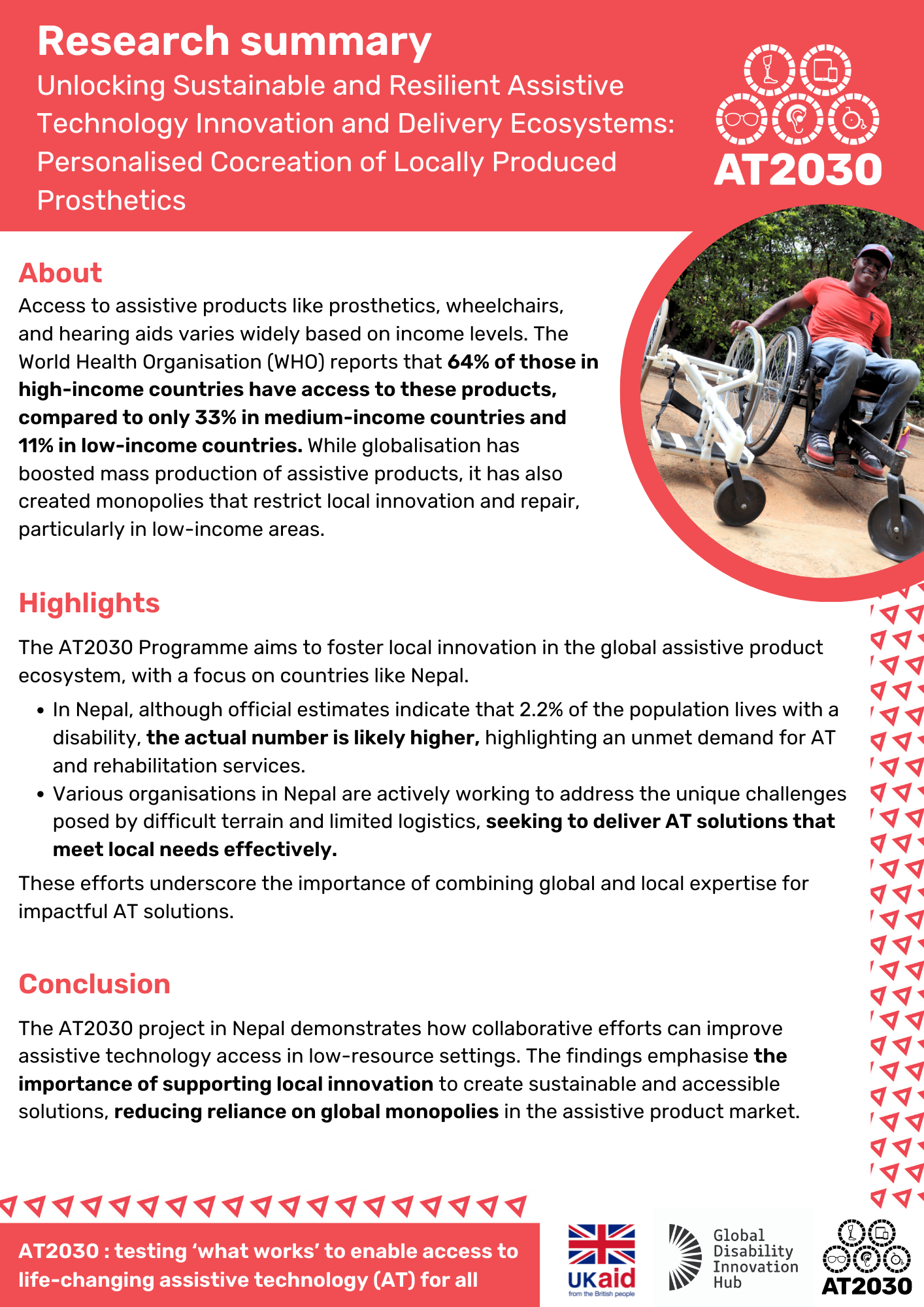
Unlocking Sustainable and Resilient Assistive Technology Innovation and Delivery Ecosystems: Personalised Cocreation of Locally Produced Prosthetics: Research Summary
Dr Ben Oldfrey, Catherine Holloway, Ashish Thapa, Mark Miodownik, Tigmanshu Bhatnagar, Bikash Paudel, RAM CHANDRA THAPA, Pratisthit Lal Shrestha, Amit Bajracharya, Ganga Gurung, Rosemary GowranNov. 7, 2024NepalResearch SummariesAccess to assistive products like prosthetics and wheelchairs is unequal globally, with only 11% access in low-income countries. The AT2030 Programme promotes local AT innovation, focusing on needs in countries like Nepal, where disability rates are likely underestimated. By fostering global-local collaboration, the project aims to improve AT access and reduce dependency on monopolistic production, supporting sustainable, accessible solutions.
-
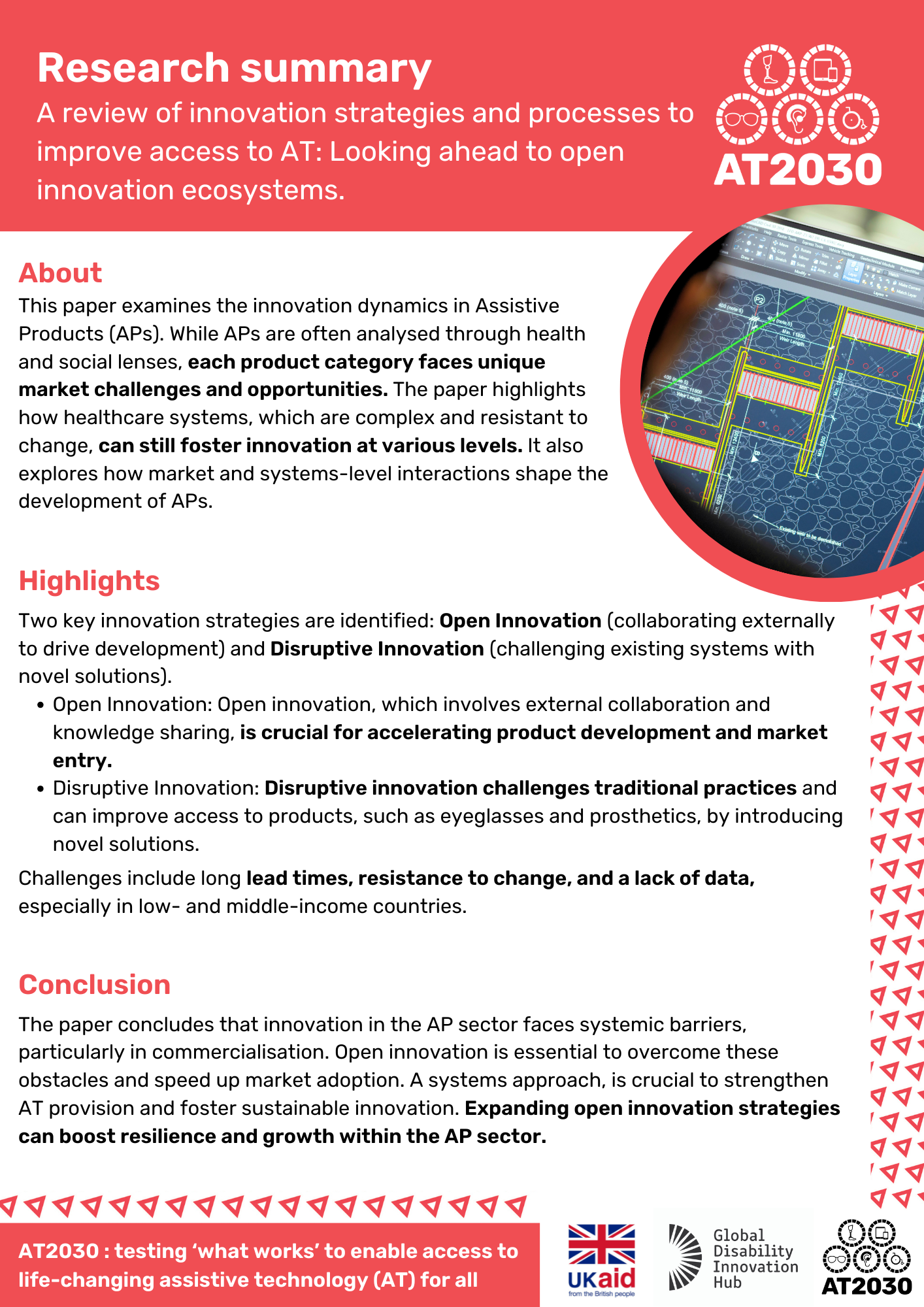
A review of innovation strategies and processes to improve access to AT: Looking ahead to open innovation ecosystems: Research Summary
Felipe Ramos Barajas, Vicki Austin, Dr Ben Oldfrey, Catherine Holloway, Dr Giulia Barbareschi, Malcolm MacLachlan, Rainer Kattel, Joanne McVeigh, Priya Morjaria, Tigmanshu Bhatnagar, George Torrens, Ikenna D. Ebuenyi, Jessica Massie, Dafne Zuleima Morgado Ramirez, Fiona Meeks, Kyle Keane, Cheryl D Metcalf, Srinivasan Sujatha, P. V. M. RaoNov. 7, 2024Research SummariesThis paper explores innovation in Assistive Products (APs), such as wheelchairs, prosthetics, eyeglasses, and hearing aids, emphasising how market dynamics and healthcare systems influence their development. It highlights the importance of *Open Innovation* and *Disruptive Innovation* in overcoming challenges like long lead times, resistance to change, and data gaps, particularly in low-income settings. The paper advocates for enhanced collaboration among stakeholders and recommends leveraging open innovation strategies to accelerate commercialisation and strengthen AP provision.
-
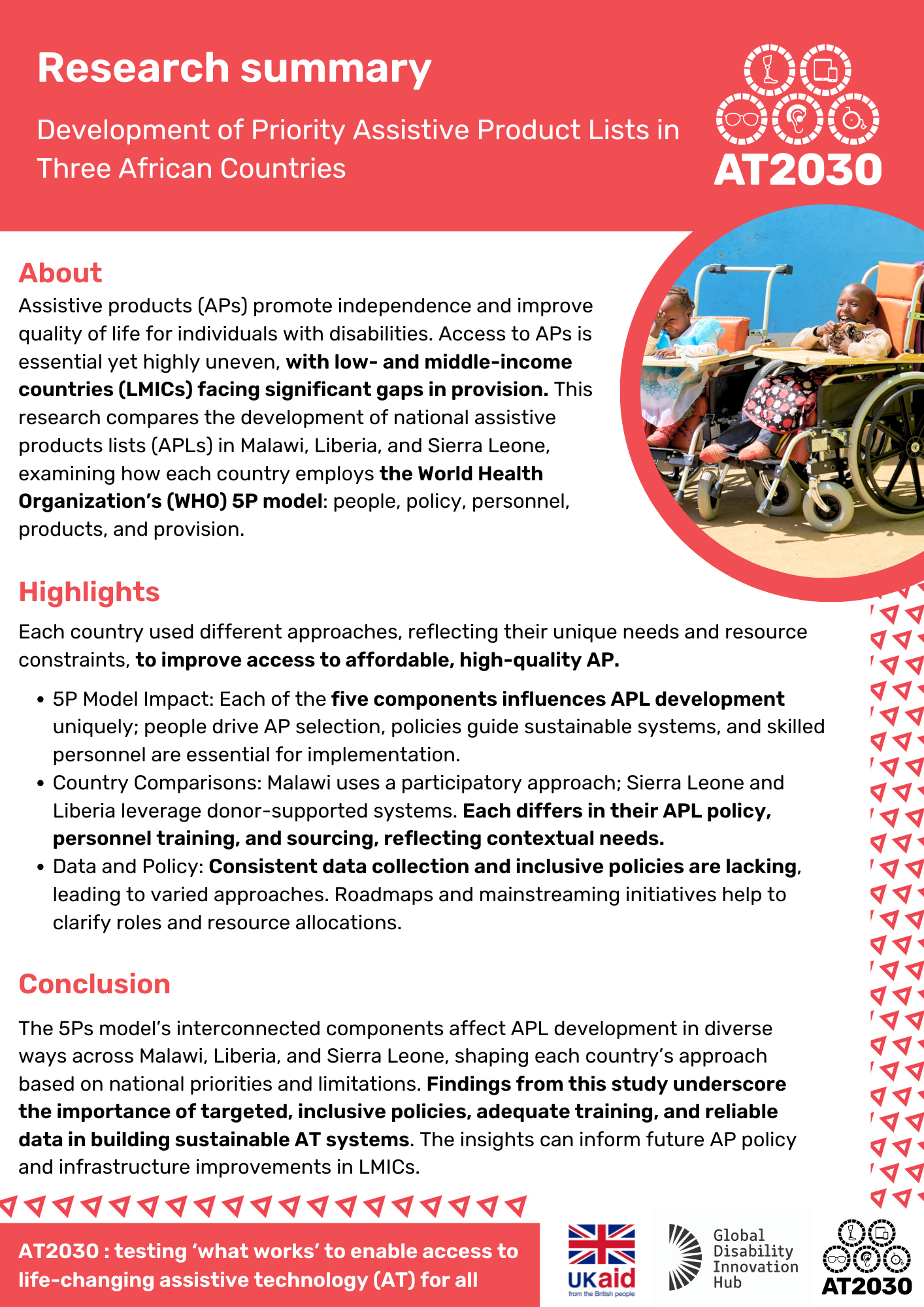
Development of Priority Assistive Product Lists in Three African Countries: Research Summary
Emma M. Smith, Ikenna D. Ebuenyi, Ying Zhang, Laura LigthartNov. 7, 2024Research SummariesAccess to assistive products (APs) is crucial for the independence of people with disabilities, yet availability is limited, especially in low- and middle-income countries (LMICs). This study compares the development of national AP lists in Malawi, Liberia, and Sierra Leone using the WHO’s 5P model—people, policy, personnel, products, and provision—each country tailoring the model to local needs. Findings emphasize that inclusive policies, trained personnel, and reliable data are essential for improving AP access, providing insights to guide future AP policies and infrastructure in LMICs.
-
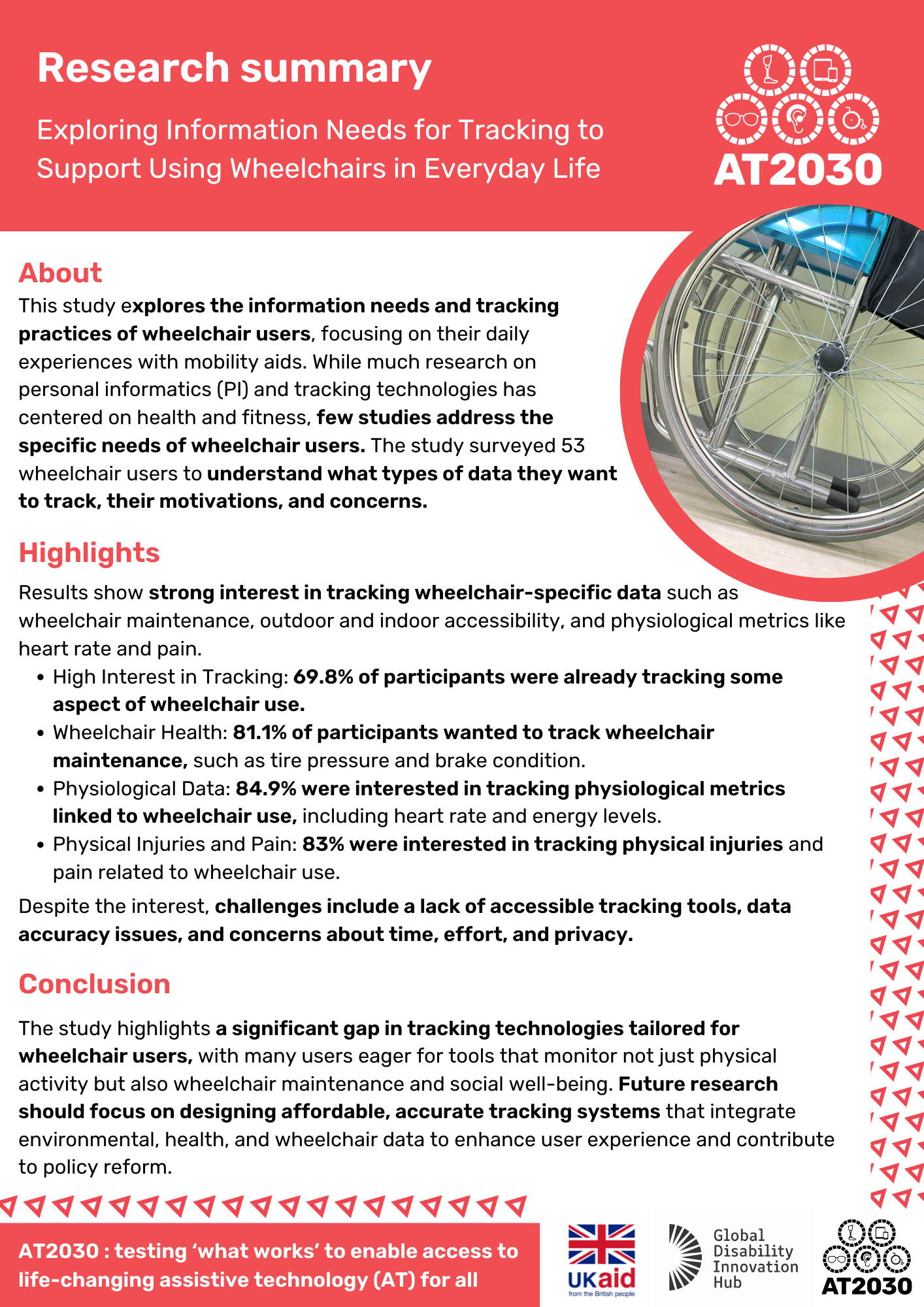
Exploring Information Needs for Tracking to Support Using Wheelchairs in Everyday Life: Research Summary
Wen Mo, Catherine Holloway, Aneesha SinghNov. 7, 2024Research SummariesThis study explores the tracking needs of wheelchair users, surveying 53 participants to understand their data preferences. Findings reveal strong interest in tracking wheelchair maintenance, accessibility, and physiological data like heart rate and pain. Users also seek to monitor social interactions and wheelchair skill development for both physical and mental well-being. Challenges include limited tracking tools, data accuracy issues, and concerns about privacy. The study calls for affordable, accurate tracking systems integrating mobility, health, and environmental data to enhance user experience and support policy reform.
-
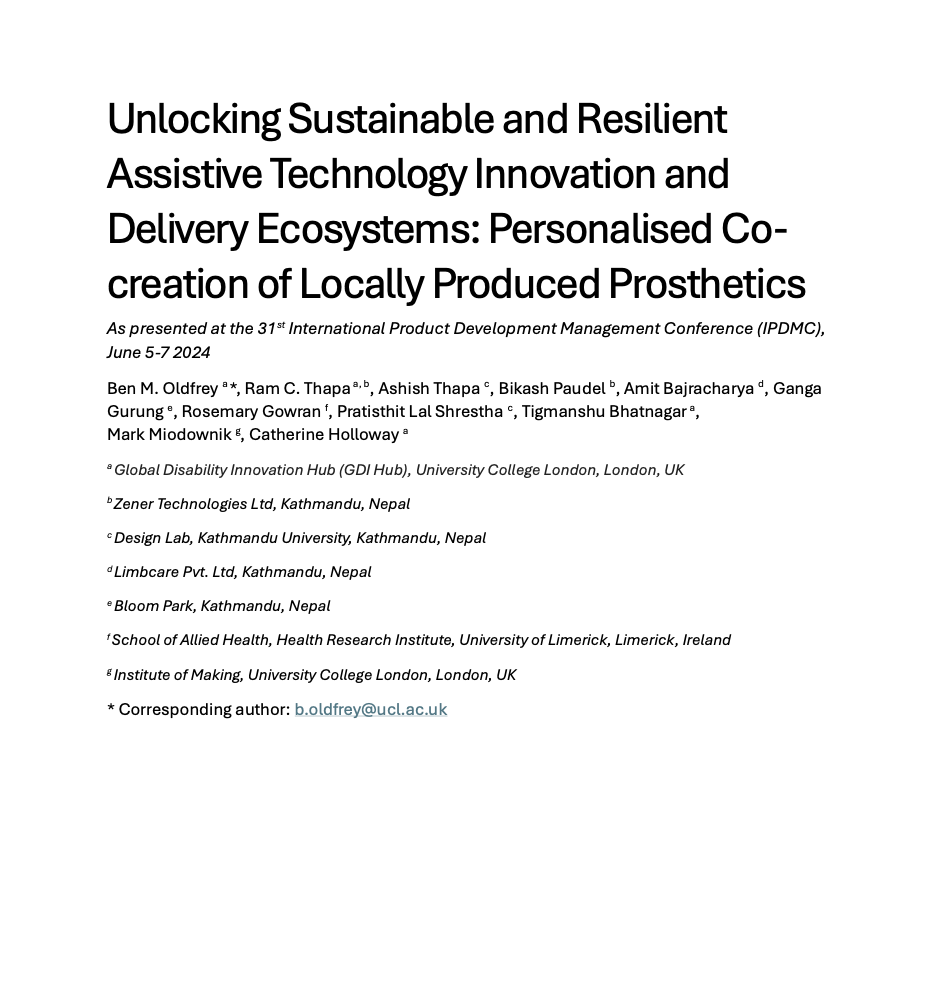
Unlocking Sustainable and Resilient Assistive Technology Innovation and Delivery Ecosystems: Personalised Co-creation of Locally Produced Prosthetics
Dr Ben Oldfrey, RAM CHANDRA THAPA, Ashish Thapa, Bikash Paudel, Amit Bajracharya, Ganga Gurung, Rosemary Gowran, Pratisthit Lal Shrestha, Tigmanshu Bhatnagar, Mark Miodownik, Catherine HollowayNov. 5, 2024NepalAcademic Research PublicationsThe World Health Organisation (WHO) reports significant disparities in access to assistive products, with 64% access in high-income countries compared to 33% in medium-income and 11% in low-income countries. The AT2030 Programme, led by the Global Disability Innovation Hub in Nepal, aims to enhance local innovation in assistive technology (AT). In Nepal, the estimated disability rate is only 2.2%, likely underestimated, as organisations work to provide tailored AT and rehabilitation services. This paper outlines our experiences in the AT2030 project, focusing on developing a global-local community, interdisciplinary innovation teams in Kathmandu, and preliminary findings from bespoke product development cases.
-
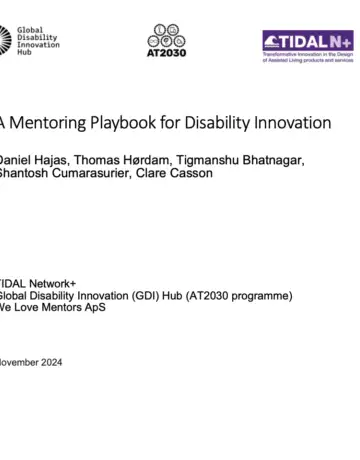
A Mentoring Playbook for Disability Innovation
Daniel Hajas, Thomas Hørdam, Tigmanshu Bhatnagar, Shantosh Cumarasurier, Clare CassonNov. 1, 2024AT2030 ResourcesThis playbook provides a comprehensive guide for organisations seeking to launch and manage mentoring programmes aimed at early career researchers (ECRs) and start-ups in the disability innovation sector. Rooted in the experiences of the TIDAL ECR Accelerator, insights from the Attvaran Accelerator, run by GDI Hub as part of the AT2030 programme, and We Love Mentors, this playbook outlines a practical and adaptable framework for fostering mentoring in a complex, yet essential, area of innovation.
Previous PageNext Page